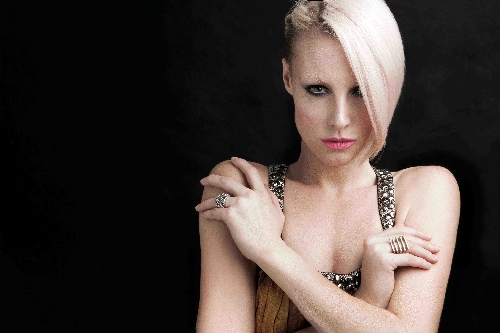DJ-producers dialing up Emma Hewitt for lyrics, vocals

One of the best ways to tell if an electronic dance song is good is if Emma Hewitt is singing on it. She’s a dance floor diva, without a prima donna attitude.
The Australian singer’s first solo singles were remixed into chart hits this year – “Colours” by Armin van Buuren and “Miss You Paradise” by Shogun.
But clubbers have heard her beautiful voice for half a decade. She sang and wrote much of the lyrics for:
Cosmic Gate’s “Be Your Sound” and “Not Enough Time”; Serge Devant’s “Take Me With You”; Dash Berlin’s “Waiting” and “Disarm Yourself”; Chris Lake’s “Carry Me Away”; Gareth Emery’s “I Will Be The Same” …
You get the point.
Hewitt’s star in electronic dance music rose in a random way, five years ago.
She was in a rock band and taking a trip through London, when she met DJ-producer Chris Lake. He liked her voice. They cut a demo, “Carry Me Away.” It became a No. 1 dance hit in 2007.
“That was a really chance meeting,” the cheerful Hewitt tells me. “We had three hours together to work on something, and we just wrote that song, and he recorded the demo and released it.”
Hewitt (classically trained on piano since 12) loved dance music, so she was stoked. But back then in 2007, she was trying to make her rock band happen, along with her brother Anthony, a guitarist.
“I thought, ‘That’s cool, but I’m still in a rock band in Australia, playing pubs and whatever else,’ ” says Hewitt, who performs Sunday at Marquee Dayclub.
Then the DJ-production duo of Cosmic Gate called, asking her to perform with them.
Then Dash Berlin called, asking the same.
“I went, ‘What am I doing? I’m playing in pubs in this rock band, trying to get it off the ground. The dance music – I enjoy doing more, because I have far more creative freedom with the vocals that I’m writing, and it’s getting far greater response.’ ”
So she and Anthony ditched the band. Now they co-write melodic lyrics together. He manages her career. Here’s how their songwriting process goes.
When DJ-producers ask her to sing on a track, they often send her demos of instrumentals. She and her brother listen, maybe rework guitar chords and melodies, and send an acoustic-vocal demo back to the DJ-producer.
“If a song can stand up on an acoustic guitar and sound like a real song, it’s going to work when it’s produced properly” for electronic dance music, she says.
Since the Hewitt siblings come from a pop-rock background, they approach electronic dance music writing similarly.
“It still has to have a verse, a pre-chorus, and a strong hooky chorus – even if it’s for a trance song or a dance song or whatever else – so there’s something singalong in there.”
At times, DJs don’t give her and Anthony such rewriting leeway, when she just sings what they ask her to vocalize.
Either way, Hewitt makes songs better, prettier and stronger, which is a win-win-win for DJs, fans and Hewitt.
“Electronic music is what gets me through my gym sessions and what makes me drive faster and,” she says, “everything else.”
Doug Elfman’s column appears Tuesdays, Thursdays and Fridays. Email him at delfman@reviewjournal.com. He blogs at reviewjournal.com/elfman.